1990 VOLKSWAGEN TRANSPORTER flat tire
[x] Cancel search: flat tirePage 71 of 165
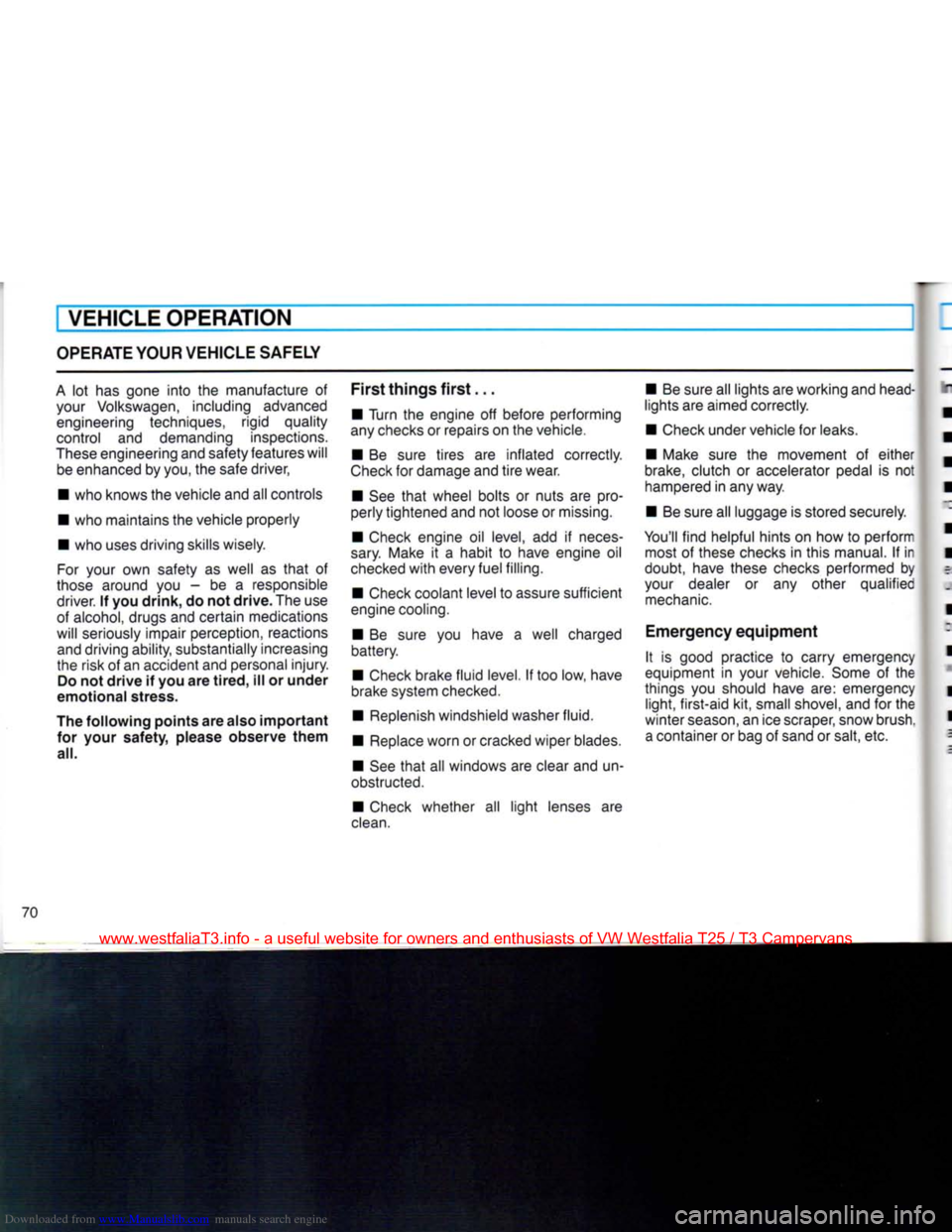
Downloaded from www.Manualslib.com manuals search engine
VEHICLE OPERATION
OPERATE
YOUR VEHICLE SAFELY
A
lot has gone
into
the manufacture of your Volkswagen, including advanced engineering techniques, rigid quality
control and demanding inspections.
These
engineering and safety features will be enhanced by you, the safe driver,
• who knows the vehicle and all controls
• who maintains the vehicle properly
• who uses driving skills wisely.
For
your own safety as well as
that
of
those around you - be a responsible
driver. If you
drink,
do not
drive.
The use
of alcohol, drugs and certain medications
will seriously impair perception, reactions and driving ability, substantially increasing
the risk of an accident and personal
injury.
Do not
drive
if you are
tired,
ill or
under
emotional
stress.
The
following
points
are also
important
for
your
safety,
please
observe
them
all.
First
things
first...
• Turn the engine off before performing
any checks or repairs on the vehicle.
• Be sure tires are inflated correctly.
Check
for damage and
tire
wear.
• See
that
wheel bolts or nuts are pro
perly tightened and not loose or missing.
• Check engine oil level, add if neces
sary.
Make it a habit to have engine oil
checked
with
every fuel filling.
• Check coolant level to assure sufficient
engine cooling.
• Be sure you have a well charged
battery.
• Check brake fluid level. If too low, have
brake system checked.
• Replenish windshield washer fluid.
• Replace worn or cracked wiper blades.
• See
that
all windows are clear and un
obstructed.
• Check whether all
light
lenses are
clean.
• Be sure all lights are working and head
lights are aimed correctly.
• Check under vehicle for leaks.
• Make sure the movement of either
brake,
clutch or accelerator pedal is not hampered in any way.
• Be sure all luggage is stored securely.
You'll
find helpful hints on how to perform most of these checks in this manual. If in
doubt, have these checks performed by
your dealer or any other qualified
mechanic.
Emergency
equipment
It is good practice to carry emergency
equipment in your vehicle. Some of the
things you should have are: emergency
light,
first-aid kit, small shovel, and for the
winter
season,
an ice scraper, snow brush,
a
container or bag of sand or salt, etc.
70
www.westfaliaT3.info - a useful website for owners and enthusiasts of VW Westfalia T25 / T3 Campervans
Page 73 of 165
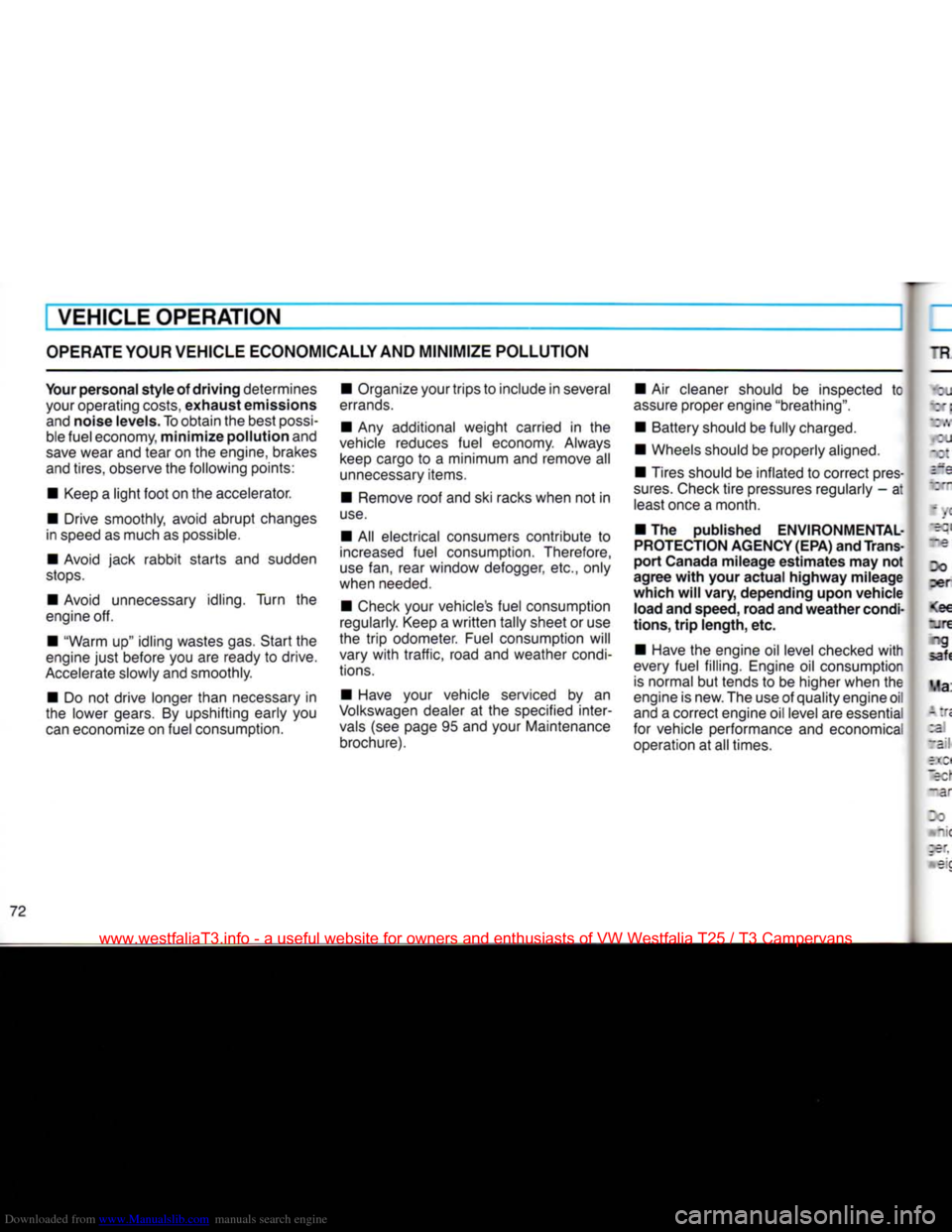
Downloaded from www.Manualslib.com manuals search engine
VEHICLE OPERATION
OPERATE
YOUR VEHICLE ECONOMICALLY AND
MINIMIZE
POLLUTION
Your
personal
style
of
driving
determines your operating costs,
exhaust
emissions and noise levels. To obtain the best
possi
ble fuel economy,
minimize
pollution
and
save
wear and tear on the engine, brakes
and tires, observe the following points:
• Keep a
light
foot
on the accelerator.
• Drive smoothly, avoid abrupt changes
in speed as much as possible.
• Avoid jack rabbit starts and sudden
stops.
• Avoid unnecessary idling. Turn the
engine off.
• "Warm up" idling wastes gas. Start the
engine
just
before you are ready to drive.
Accelerate
slowly and smoothly.
• Do not drive longer than necessary in
the lower gears. By upshifting early you
can
economize on fuel consumption. • Organize your trips to include in several
errands.
• Any additional weight carried in the
vehicle reduces fuel economy. Always keep cargo to a minimum and remove all
unnecessary
items.
• Remove roof and ski racks when not in
use.
• All electrical consumers contribute to
increased
fuel consumption. Therefore,
use
fan, rear window defogger, etc., only
when needed.
• Check your vehicle's fuel consumption
regularly. Keep a
written
tally sheet or use
the
trip
odometer. Fuel consumption will
vary
with
traffic, road and weather condi
tions.
• Have your vehicle serviced by an
Volkswagen
dealer at the specified inter
vals
(see page 95 and your Maintenance brochure). • Air cleaner should be inspected to
assure
proper engine "breathing".
• Battery should be fully charged.
• Wheels should be properly aligned.
• Tires should be inflated to correct pres
sures.
Check
tire
pressures regularly - at least once a month.
• The published ENVIRONMENTAL-
PROTECTION AGENCY (EPA) and Trans
port
Canada
mileage
estimates
may not
agree
with
your
actual
highway
mileage
which
will
vary,
depending
upon
vehicle
load
and speed,
road
and
weather
condi
tions,
trip
length,
etc.
• Have the engine oil level checked
with
every fuel filling. Engine oil consumption
is
normal but tends to be higher when the
engine is new. The use of quality engine oil
and a correct engine oil level are essential
for vehicle performance and economical operation at all times.
72
www.westfaliaT3.info - a useful website for owners and enthusiasts of VW Westfalia T25 / T3 Campervans
Page 74 of 165
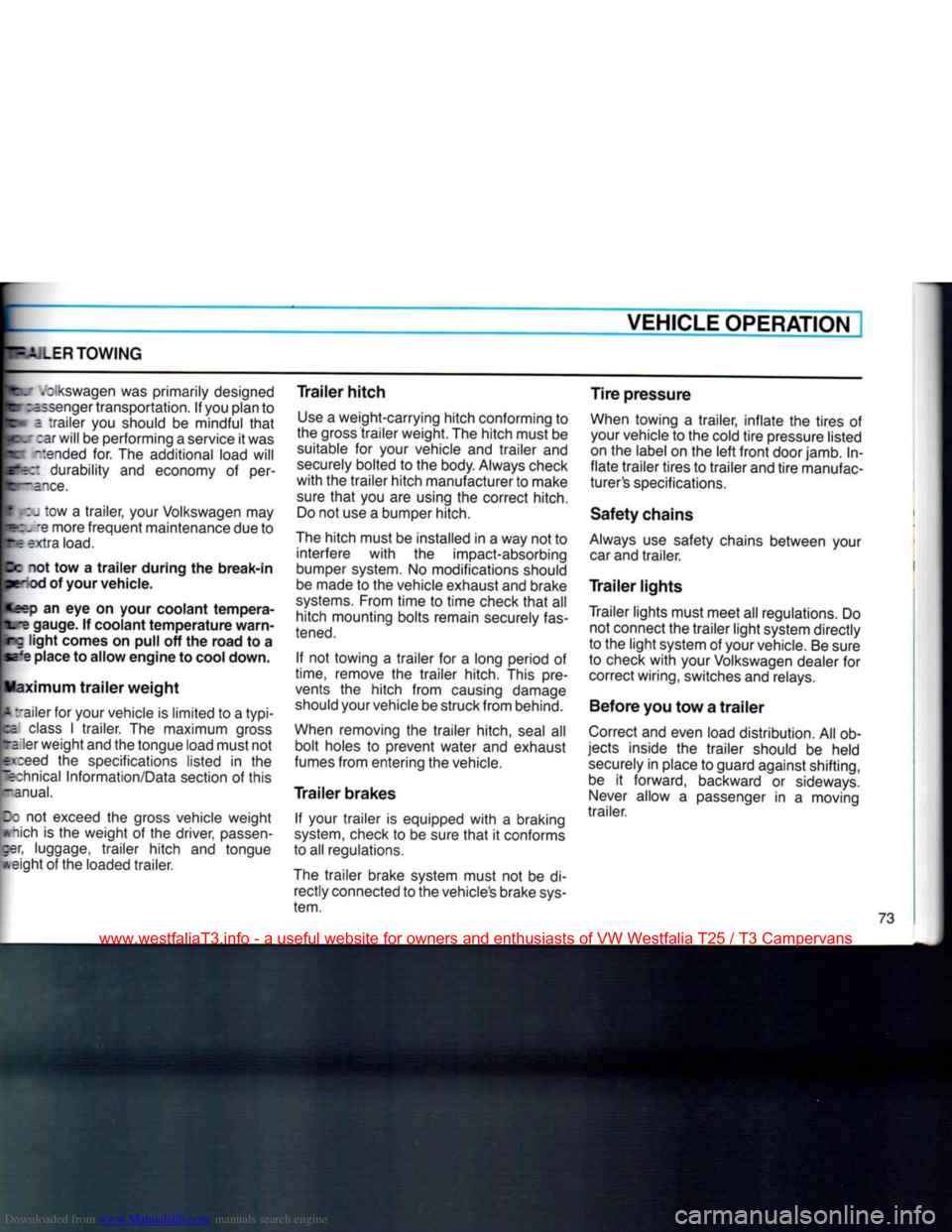
Downloaded from www.Manualslib.com manuals search engine
iLER TOWING
VEHICLE OPERATION
phLT .'jlkswagen was primarily designed
pr : assenger transportation. If you plan to
m*
B.
trailer you should be mindful that
MLT
:ar will be performing a service it was
•cr "tended for. The additional load will
Wee durability and economy of per-
m~ ance. • :. :ow a trailer, your Volkswagen may
mc. -9 more frequent maintenance due to
ft* extra
load.
Gc not tow a trailer during the break-in kriod of your vehicle.
Keep an eye on your coolant tempera-
fere gauge. If coolant temperature warn- rc light comes on pull off the road to a sa's place to allow engine to cool down.
Maximum trailer weight
A vailer for your vehicle is limited to a
typi-
ca class I trailer. The maximum gross
Bier weight and the tongue load must not
eoeed the specifications listed in the
[fechnical Information/Data section of this
ranual.
Do not exceed the gross vehicle weight
•rhich is the weight of the driver, passen ger, luggage, trailer hitch and tongue
weight of the loaded trailer. Trailer hitch
Use a weight-carrying hitch conforming to
the gross trailer weight. The hitch must be suitable for your vehicle and trailer and
securely bolted to the body. Always check
with the trailer hitch manufacturer to make
sure that you are using the correct hitch. Do not use a bumper hitch.
The hitch must be installed in a way not to interfere with the impact-absorbing
bumper system. No modifications should
be made to the vehicle exhaust and brake
systems. From time to time check that all hitch mounting bolts remain securely fas
tened.
If not towing a trailer for a long period of
time,
remove the trailer hitch. This pre
vents the hitch from causing damage should your vehicle be struck from behind.
When removing the trailer hitch, seal all bolt holes to prevent water and exhaust
fumes from entering the vehicle.
Trailer brakes If your trailer is equipped with a braking
system,
check to be sure that it conforms
to all regulations.
The trailer brake system must not be di rectly connected to the vehicle's brake sys
tem.
Tire pressure
When towing a trailer, inflate the tires of
your vehicle to the cold tire pressure listed on the label on the left front door jamb. In
flate trailer tires to trailer and tire manufac
turer's specifications.
Safety chains
Always use safety chains between your car and trailer.
Trailer lights
Trailer lights must meet all regulations. Do not connect the trailer light system directly
to the light system of your vehicle. Be sure
to check with your Volkswagen dealer for
correct wiring, switches and relays.
Before you tow a trailer
Correct and even load distribution. All ob
jects inside the trailer should be held securely in place to guard against shifting, be it forward, backward or sideways.
Never allow a passenger in a moving
trailer.
www.westfaliaT3.info - a useful website for owners and enthusiasts of VW Westfalia T25 / T3 Campervans
Page 81 of 165
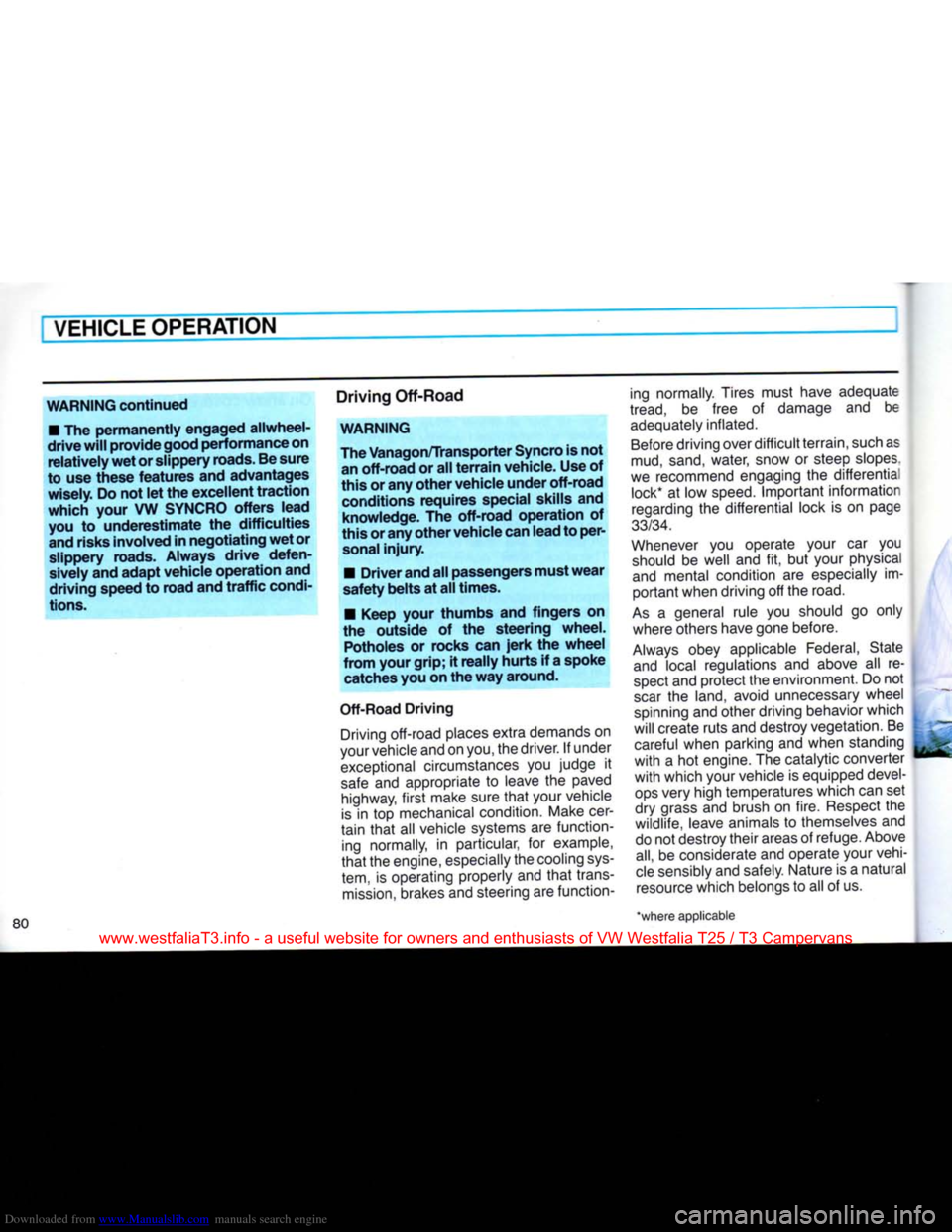
Downloaded from www.Manualslib.com manuals search engine
VEHICLE
OPERATION
WARNING continued
•
The permanently engaged allwheel-
drive
will
provide
good
performance on relatively wet or slippery
roads.
Be
sure
to use these features and advantages
wisely. Do not let the excellent traction
which your VW
SYNCRO
offers lead
you
to underestimate the difficulties
and risks involved in negotiating wet or
slippery
roads. Always drive defen
sively
and adapt vehicle operation and
driving speed to road and
traffic
condi
tions.
Driving Off-Road
WARNING
The Vanagon/Transporter
Syncro
is not an off-road or all
terrain
vehicle. Use of
this or any other vehicle under off-road
conditions
requires special skills and knowledge. The off-road operation of
this or any other
vehicle
can
lead
to per
sonal
injury.
•
Driver and all
passengers
must
wear
safety belts at all times.
•
Keep your thumbs and fingers on
the outside of the steering wheel.
Potholes
or rocks can
jerk
the
wheel
from your grip; it really hurts if a spoke
catches
you on the way around.
Off-Road
Driving
Driving off-road places extra demands
on
your vehicle and on you, the driver.
If
under
exceptional
circumstances
you
judge
it
safe
and
appropriate
to
leave
the
paved highway,
first
make sure
that
your vehicle
is
in top
mechanical condition. Make cer
tain
that
all
vehicle systems
are
function ing normally,
in
particular,
for
example,
that
the engine, especially the cooling
sys
tem,
is
operating properly and
that
trans
mission,
brakes and steering are function ing normally. Tires must have adequate
tread,
be
free
of
damage
and be
adequately inflated.
Before
driving over
difficult
terrain, such as
mud,
sand,
water, snow
or
steep
slopes,
we recommend engaging
the
differentia lock*
at low
speed.
Important
information
regarding
the
differential lock
is on
page
33/34.
Whenever
you
operate your
car you
should
be
well
and fit, but
your physical
and
mental condition
are
especially
im
portant
when driving
off
the road.
As
a
general rule
you
should
go
only where others have gone before.
Always
obey applicable
Federal,
State
and
local regulations
and
above
all re
spect
and protect the environment. Do
not
scar
the
land, avoid unnecessary wheel
spinning and other driving behavior which
will
create
ruts
and destroy vegetation.
Be
careful when parking and when standing
with
a hot
engine. The catalytic converter
with
which your vehicle
is
equipped devel
ops
very high temperatures which can set
dry grass and brush
on
fire. Respect
the
wildlife, leave animals
to
themselves
and
do not destroy their areas
of
refuge. Above
all,
be
considerate and operate your vehi
cle
sensibly and safely. Nature
is a
natural
resource
which belongs
to
all
of
us.
'where applicable
www.westfaliaT3.info - a useful website for owners and enthusiasts of VW Westfalia T25 / T3 Campervans
Page 87 of 165
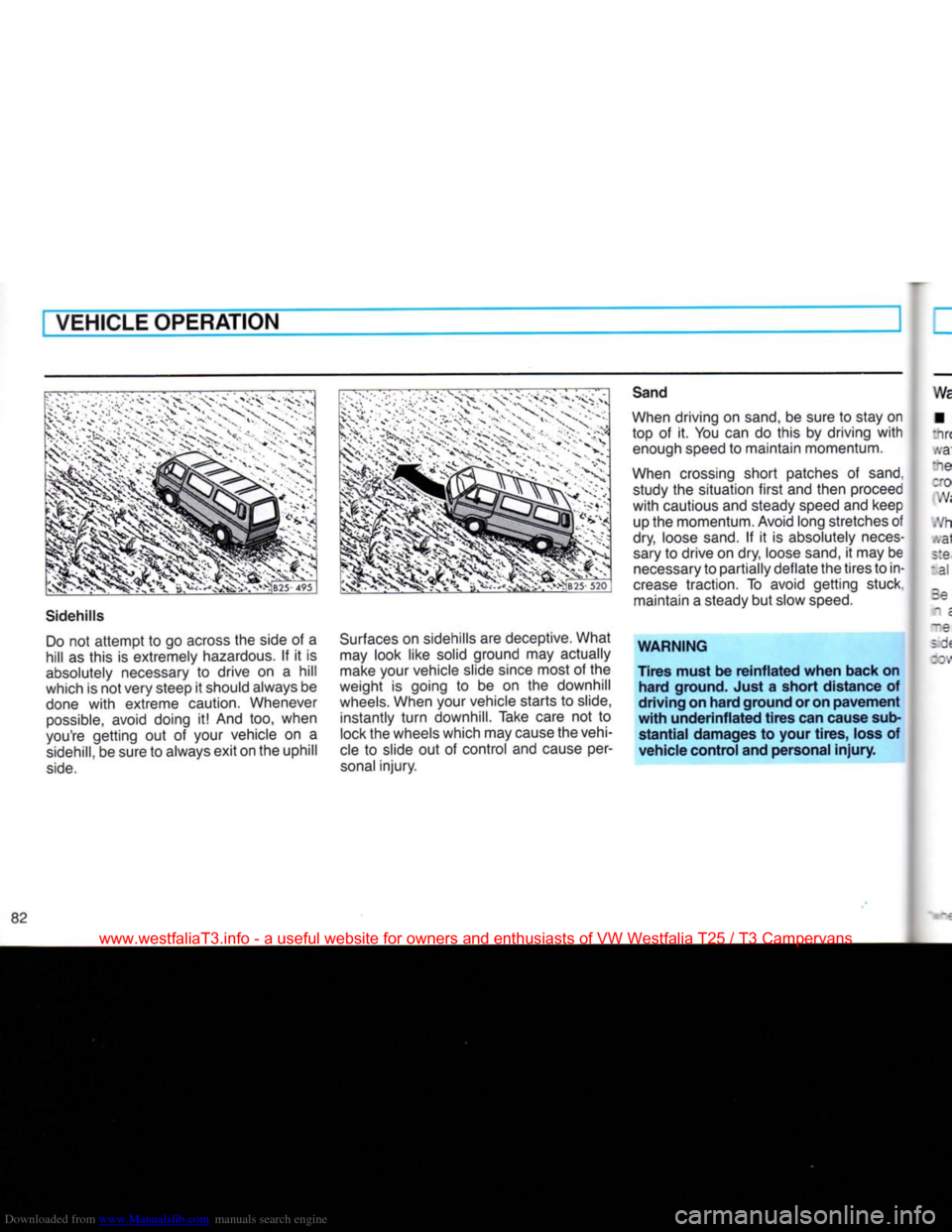
Downloaded from www.Manualslib.com manuals search engine
VEHICLE OPERATION
Sidehills
Do
not
attempt
to go across the side of a
hill as this is extremely hazardous. If it is
absolutely necessary to drive on a hill
which is not very steep it should always be
done
with
extreme caution. Whenever
possible,
avoid doing it! And too, when
you're getting out of your vehicle on a
sidehill,
be sure to always exit on the uphill
side.
Surfaces
on sidehills are deceptive. What
may look like solid ground may actually
make your vehicle slide since most of the
weight is going to be on the downhill
wheels.
When your vehicle starts to slide, instantly
turn
downhill. Take care not to
lock the wheels which may cause the vehi
cle
to slide out of control and cause per
sonal
injury.
Sand
When driving on
sand,
be sure to stay on top of it. You can do this by driving
with
enough speed to maintain momentum.
When crossing short patches of
sand,
study the situation
first
and then proceed
with
cautious and steady speed and keep up the momentum. Avoid long stretches of
dry, loose
sand.
If it is absolutely neces
sary
to drive on dry, loose
sand,
it may be
necessary
to partially deflate the tires to in
crease
traction. To avoid getting stuck, maintain a steady but slow
speed.
WARNING
Tires
must
be
reinflated
when
back
on
hard
ground. Just a
short
distance
of
driving
on
hard
ground
or on
pavement
with
underinflated
tires
can cause sub
stantial
damages
to
your
tires,
loss of
vehicle
control
and
personal
injury.
www.westfaliaT3.info - a useful website for owners and enthusiasts of VW Westfalia T25 / T3 Campervans
Page 88 of 165
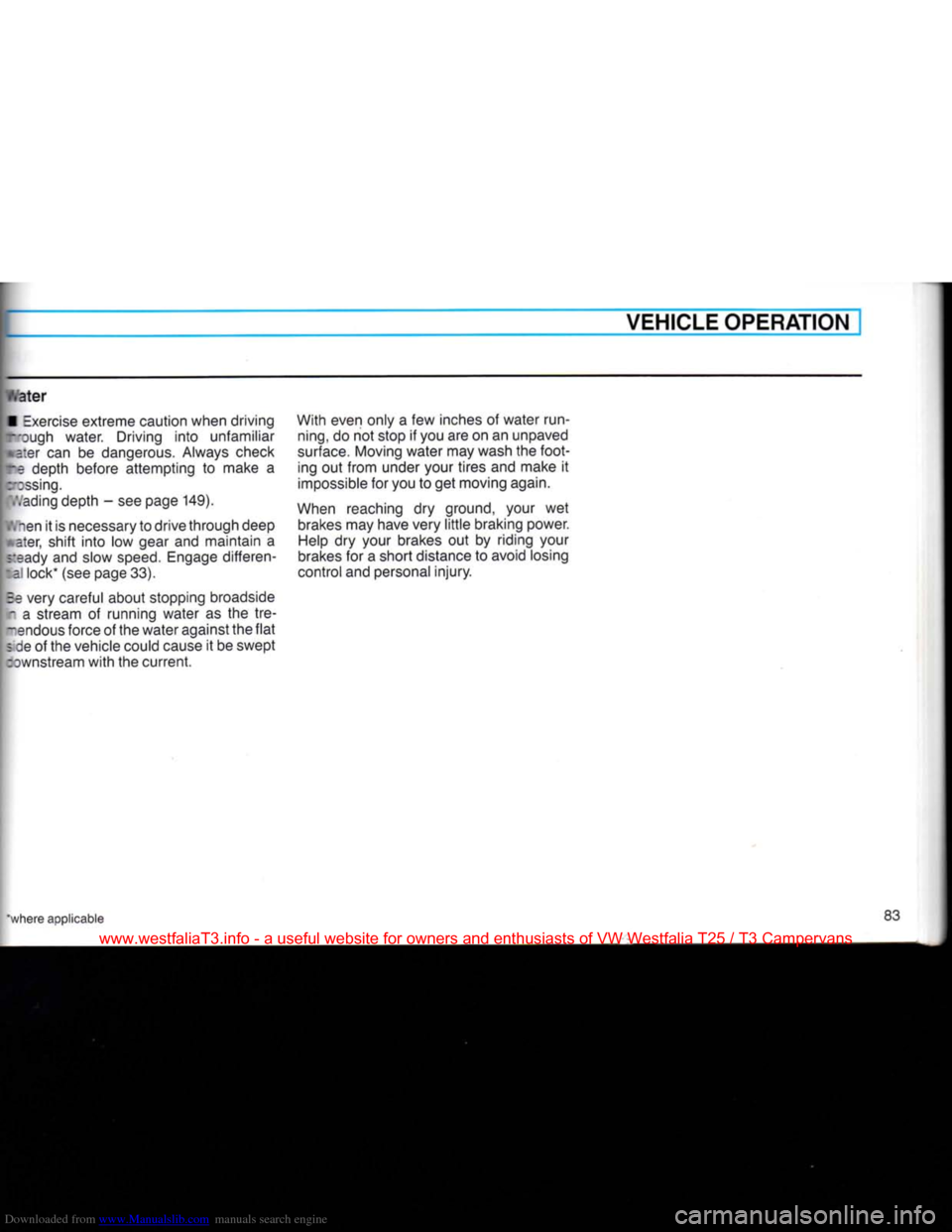
Downloaded from www.Manualslib.com manuals search engine VEHICLE OPERATION
iVater
•
Exercise
extreme caution when driving
T'ough water. Driving
into
unfamiliar
a:er
can be dangerous. Always check
~e
depth before attempting to make a
possing.
7,'ading depth - see page 149).
Vi nen it is necessary to drive through deep ater, shift
into
low gear and maintain a
ready
and slow
speed.
Engage differen-
:=] lock* (see page 33).
Be
very careful about stopping broadside
r a stream of running water as the tre-
-endous
force of the water against the
flat
; de of the vehicle could cause it be swept :ownstream
with
the current. With even only a few inches of water run
ning,
do not stop if you are on an unpaved
surface.
Moving water may wash the
foot
ing out from under your tires and make it
impossible
for you to get moving again.
When
reaching dry ground, your wet
brakes
may have very
little
braking power.
Help
dry your brakes out by riding your
brakes
for a short distance to avoid losing
control and personal
injury.
www.westfaliaT3.info - a useful website for owners and enthusiasts of VW Westfalia T25 / T3 Campervans
Page 119 of 165
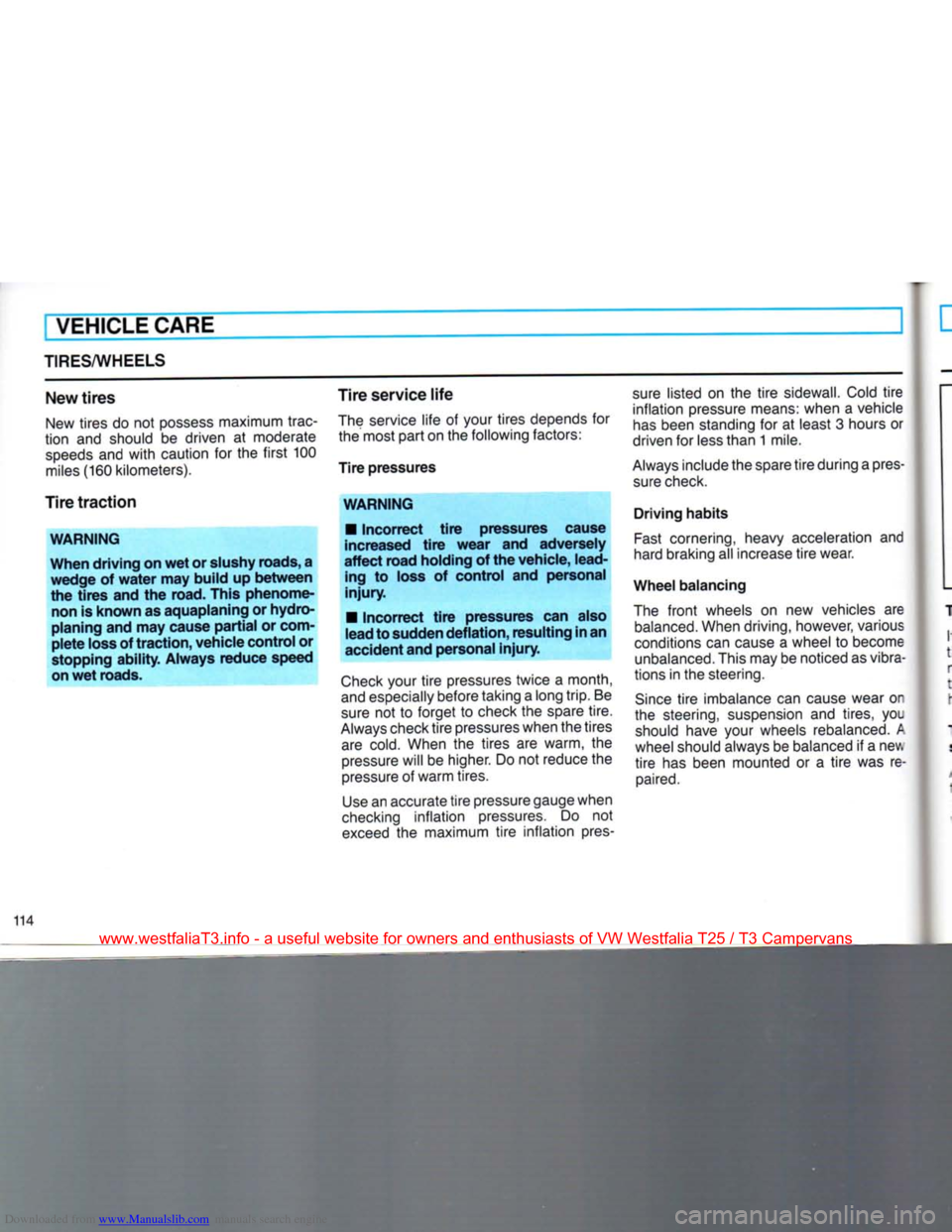
Downloaded from www.Manualslib.com manuals search engine
VEHICLE CARE
TIRES/WHEELS
New tires
New
tires
do not
possess
maximum trac
tion
and
should
be
driven
at
moderate
speeds
and
with
caution
for the
first
100
miles (160 kilometers).
Tire traction
WARNING
When driving on wet or slushy roads, a wedge of
water
may build up
between
the tires and the road. This phenome non is known as aquaplaning or hydro
planing and may cause
partial
or
com
plete
loss
of traction, vehicle control or
stopping ability. Always reduce speed
on
wet roads.
Tire service life
The service
life
of
your tires depends
for
the most
part
on the following factors:
Tire pressures
WARNING
•
Incorrect
tire
pressures cause
increased
tire
wear
and adversely
affect
road holding of the vehicle, lead ing to
loss
of control and personal
injury.
•
Incorrect
tire
pressures can also
lead to
sudden
deflation, resulting
in
an
accident and personal injury.
Check
your
tire
pressures twice
a
month,
and especially before taking
a
long
trip.
Be
sure
not to
forget
to
check
the
spare tire.
Always check
tire
pressures when the tires are cold. When
the
tires
are
warm,
the
pressure
will
be
higher.
Do not
reduce
the
pressure
of
warm tires.
Use
an accurate
tire
pressure gauge when
checking inflation pressures.
Do not
exceed
the
maximum
tire
inflation pres sure listed
on the
tire
sidewalk Cold
tire
inflation pressure means: when
a
vehicle
has
been standing
for at
least
3
hours
or
driven
for
less than 1 mile.
Always include the spare
tire
during
a
pres sure check.
Driving habits
Fast
cornering, heavy acceleration
and
hard braking all increase
tire
wear.
Wheel balancing
The
front
wheels
on new
vehicles
are
balanced.
When driving, however, various
conditions can cause
a
wheel
to
become
unbalanced.
This may
be
noticed as vibra
tions
in the
steering.
Since
tire
imbalance
can
cause wear
or
the steering, suspension
and
tires,
you
should have your wheels rebalanced.
A
wheel should always
be
balanced
if a
nev,
tire
has
been mounted
or a
tire
was re
paired.
114
www.westfaliaT3.info - a useful website for owners and enthusiasts of VW Westfalia T25 / T3 Campervans
Page 121 of 165
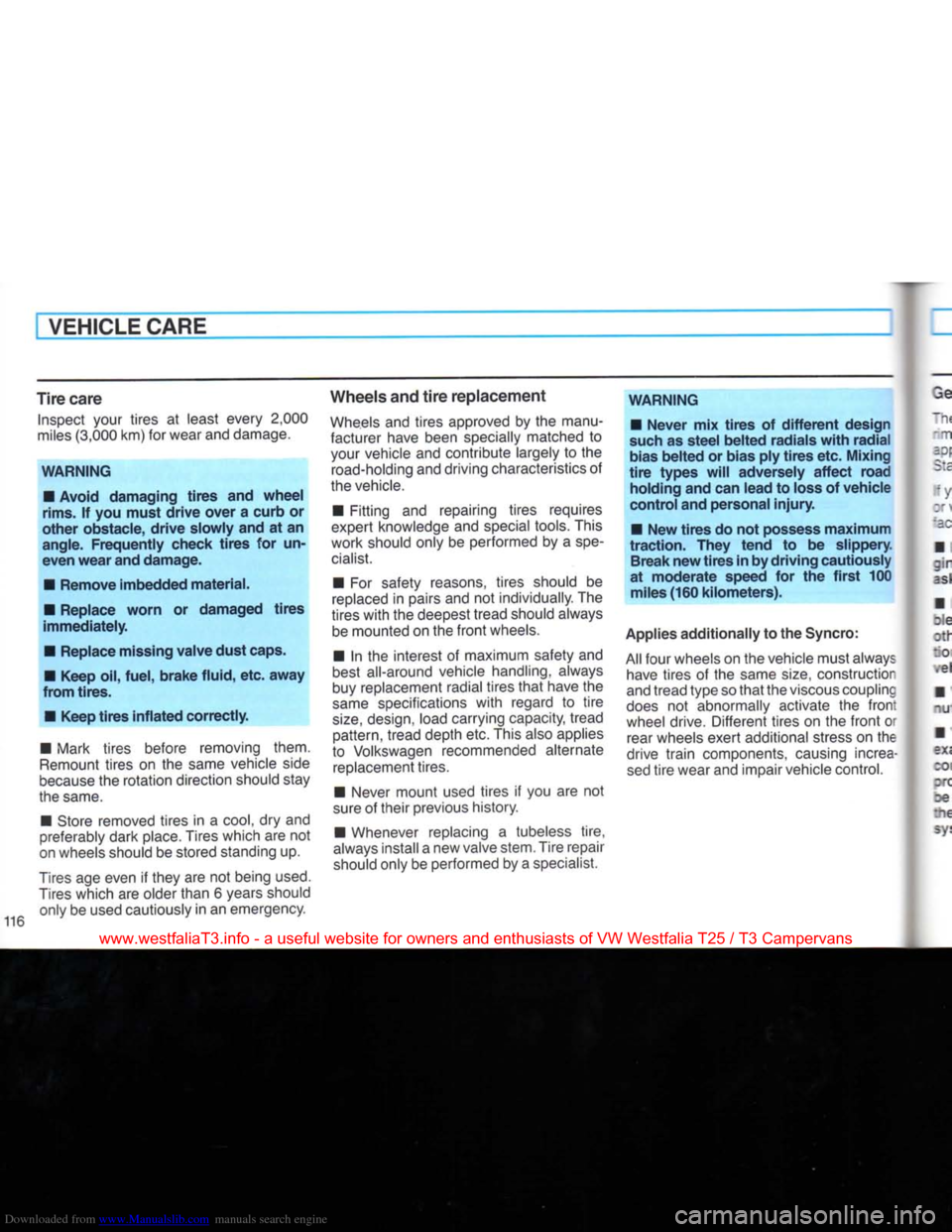
Downloaded from www.Manualslib.com manuals search engine
VEHICLE CARE
Tire
care
Inspect your tires at least every 2,000
miles (3,000 km) for wear and damage.
WARNING
• Avoid
damaging
tires
and
wheel
rims.
If you
must
drive
over
a
curb
or
other
obstacle,
drive
slowly
and at an
angle.
Frequently
check
tires
for un
even
wear
and
damage.
•
Remove
imbedded
material.
•
Replace
worn
or
damaged
tires
immediately.
•
Replace
missing
valve
dust
caps.
• Keep oil,
fuel,
brake
fluid,
etc.
away
from
tires.
• Keep
tires
inflated
correctly.
• Mark tires before removing them.
Remount tires on the same vehicle side
because
the rotation direction should stay
the same.
• Store removed tires in a
cool,
dry and
preferably dark place. Tires which are not
on wheels should be stored standing up.
Tires
age even if they are not being
used.
Tires
which are older than 6 years should only be used cautiously in an emergency.
Wheels
and
tire
replacement
Wheels
and tires approved by the manu
facturer have been specially matched to
your vehicle and contribute largely to the road-holding and driving characteristics of
the vehicle.
• Fitting and repairing tires requires
expert knowledge and special tools. This
work should only be performed by a
spe
cialist.
• For safety reasons, tires should be
replaced
in pairs and not individually. The
tires
with
the deepest tread should always be mounted on the
front
wheels.
• In the interest of maximum safety and
best all-around vehicle handling, always
buy replacement radial tires
that
have the
same
specifications
with
regard to
tire
size,
design, load carrying capacity, tread pattern, tread depth etc. This also applies
to Volkswagen recommended alternate replacement tires.
• Never mount used tires if you are not
sure of their previous history.
• Whenever replacing a tubeless tire,
always install a new valve stem. Tire repair
should only be performed by a specialist.
WARNING
•
Never
mix
tires
of
different
design
such as
steel
belted
radials
with
radial
bias
belted
or
bias
ply
tires
etc.
Mixing
tire
types
will
adversely
affect
road
holding
and can
lead
to loss of
vehicle
control
and
personal
injury.
• New
tires
do not possess
maximum
traction.
They
tend
to be
slippery.
Break
new
tires
in by
driving
cautiously
at
moderate
speed for the
first
100
miles
(160
kilometers).
Applies
additionally
to the Syncro:
All
four wheels on the vehicle must always have tires of the same
size,
construction
and tread type so
that
the viscous coupling
does
not abnormally activate the
front
wheel drive. Different tires on the
front
or rear wheels exert additional stress on the
drive
train
components, causing increa
sed
tire
wear and impair vehicle control.
www.westfaliaT3.info - a useful website for owners and enthusiasts of VW Westfalia T25 / T3 Campervans